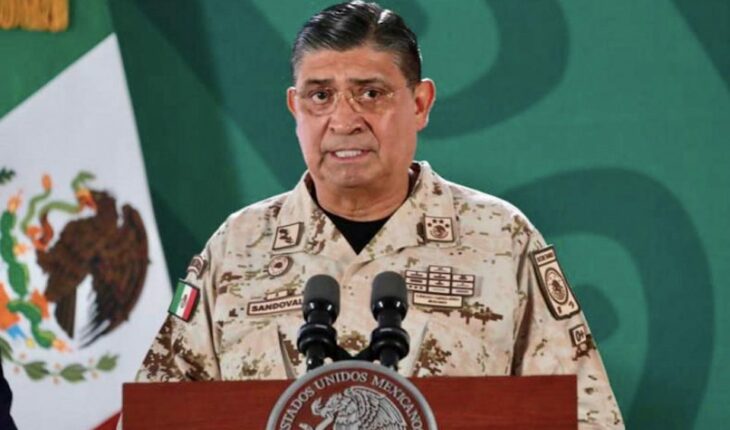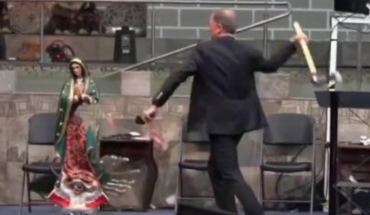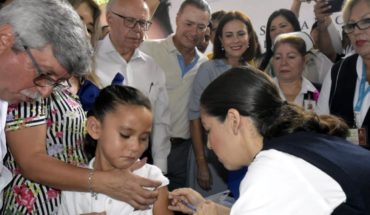The head of the Secretariat of National Defense (Sedena), Luis Cresencio Sandoval, sent a letter to President Andrés Manuel López Obrador in which he interceded for Captain José Martínez Crespo, against whom there are two criminal proceedings for the alleged crimes of organized crime and forced disappearance of the Ayotzinapa students.
The document, dated January 18, 2021, gives an account of a visit made by a military commander to the prison of Military Camp No.1-A, where Captain Martínez Crespo had been detained since November 11, 2020.
After the meeting, the Secretary of Defense wrote to the president that Crespo defined himself as “an institutional man, since when he has been officially or unofficially interrogated he has always shown willingness to narrate the events of which he was aware or that by instructions received he had participation.”
This information is part of the thousands of Army files leaked by the Guacamaya hacktivist group.
Other documents show that General Sandoval has also held meetings with Julio Scherer Ibarra, former legal adviser to the Presidency and partner of lawyers Alejandro Robledo and César Omar González, who make up the legal defense of the four military officers prosecuted for the disappearance of the 43 normalistas.
As the secretary told López Obrador, the captain remained in his position that he is innocent, that the accusation against him is based solely on the testimony of a protected witness and a narcomanta, and that he trusts that the justice system would determine his freedom.
By the time Sandoval sent the letter to the president, Captain Martínez Crespo had only been linked to prosecution for the crime of organized crime in order to commit crimes against health, allegedly having ties to the criminal organization Guerreros Unidos. On September 20, a federal judge issued a second arrest warrant, now for enforced disappearance.
Sandoval told López Obrador that no discrepancies have been found in the captain’s income and assets, “the authorities did not find evidence of greater economic capacity than what he has been able to obtain as a result of his income.”
The defense secretary told López Obrador that Crespo refused for the second time to avail himself of a criterion of opportunity to collaborate in the investigation, considering that he is innocent.
“It was proposed to him to take advantage of the protected witness program, referring to the fact that this offer had already been made by Mr. Alejandro Encinas in the interview held on Dec. 8. 2020, refusing for the second time to accept it, since he claims not to be responsible for having participated in the events in which they intend to link him to the disappearance of the students, nor to belong or have belonged to any organized crime group. ”
“He pointed out that the process that follows is based only on two references by which they intend to implicate him, one by ‘Juan’, a protected witness who he claims to have knowledge of resides in the U.S. and that this subject ‘was indeed a member of a criminal organization’; the other reference is a blanket that appeared in Iguala, Gro., a month after the fact, where a captain and a lieutenant of the 27/o were pointed out. Infantry Battalion, identified as ‘Crespo’ and ‘Barbosa’, and that by this mention they have tried to indict him, “said Sandoval.
According to the head of the Sedena, the captain reiterated his testimony that on the night of September 26 he was patrolling Iguala with a group of soldiers, and that in the private hospital Cristina they found wounded students. He reported the situation to his superior, General José Rodríguez Pérez — linked to the organized crime trial — and sent a part of his group of soldiers to a point where bodies lay and where local authorities were already carrying out proceedings.
“Finally, he said that he will remain firm in his determination that his innocence must be recognized, expressing confidence in the Judicial System and that with great certainty his freedom from legal responsibilities will soon be determined in the face of the accusations that are imputed to him (sic),” Sandoval added.
Meetings of the head of the Army with Scherer and García Harfuch
The head of the Sedena held a private meeting with the former legal adviser Julio Scherer Ibarra, on the morning of August 18, hours before the Truth Commission for the Ayotzinapa case published its most recent report, in which the relatives of the normalistas were revealed telephone exchanges that indicate, allegedly, an active involvement of members of the Army in the disappearance.
Scherer is linked, through law firms, with Alejandro Robledo and César Omar González, who lead the legal defense of the four soldiers prosecuted for the disappearance of the 43 normalistas: Brigadier General José Rodríguez Pérez, former head of the 27th Battalion, Captain José Martínez Crespo, Second Lieutenant Fabián Alejandro Pirita Ochoa and First Infantry Soldier Eduardo Mota Esquivel.
The meeting between Sandoval and Scherer — at the Morelos Military House of Military Camp No. 1-A — was also attended by the head of the Secretariat of Citizen Security of the CDMX (SSC), Omar García Harfuch, who was a delegate of the Federal Police in Guerrero and was accused by the FGR of allegedly participating in a conclave where the so-called “historical truth” about the case was concocted.
The meeting between Sandoval, Scherer and García Harfuch is on Sandoval’s agenda of activities, which was accessed thanks to the leak of Guacamaya documents. Meetings between the three characters have been frequent in recent months, according to the revised documents.
General recommended cienfuegos to instruct the military before declaring
Army elements belonging to the 27th Infantry Battalion based in Iguala, Guerrero, may have been instructed on how to give their statements to civilian authorities and independent investigators regarding the role they played on September 26 and 27, 2014, in the context of the disappearance of the Ayotzinapa students.
On May 16, 2015, retired General Humberto Alfonso Guillermo Aguilar sent a letter to the then Secretary of National Defense, Salvador Cienfuegos, in which he recommended “preparing” the military who could be interviewed by the Interdisciplinary Group of Independent Experts (GIEI), and suggested making sure that there were no “inconsistencies” in the files.
In his capacity as a retired general, Guillermo Aguilar served as advisor to the head of the Sedena. No evidence was found that his recommendations were adopted by Cienfuegos, who, in fact, opposed the military being interrogated, claiming that questioning their actions would mean damage to the prestige of the Armed Forces.
The retired general was later identified as allegedly responsible for the illegal importation of German weapons that were smuggled into conflict zones in Mexico, including Guerrero.
On May 11, 2015, just over seven months after the events in Iguala, the GIEI appointed by the Inter-American Commission on Human Rights (IACHR) made a public presentation of progress in its investigation.
In the report, the independent experts noted complaints of torture, cruel treatment and disruption of due process; fragmentation of the investigation into 13 criminal cases and six different courts, as well as cover-up, obstruction of justice and abuse of authority.
However, two of his proposals set off the alerts in the Army. The first is that the GIEI request that the crime against the students be classified as forced disappearance and not as kidnapping; the second, his insistence on interviewing elements of the 27th Infantry Battalion directly and without the intermediation of the prosecutors’ offices.
Regarding the first point, General Guillermo Aguilar warned Cienfuegos that “it should not be accepted that the Ayotzinapa case is considered as forced disappearance,” since this classification, added to the notion of “state crime,” could have serious consequences for the Mexican government.
“His insistence on recommending that Ayotzinapa be classified as Forced Disappearance should not be accepted since not all the grounds are met to qualify it in this way, in addition to the fact that this concept is linked to that of State Crime and the government of Mexico did not order or participate in the events of Sep. 26, 14. The link between Forced Disappearance and State Crime could be serious for the Mexican government (sic),” the recommendations said.
“It is necessary to remind the IACHR that in the Ayotzinapa case it was organized crime that, with its decisive economic power and intimidation, manipulated a weak municipal government, which worked linked to the ‘Guerreros Unidos,'” and that this group of criminals acted against young people who were possibly used by the group of ‘Los Rojos.'” instructed the retired general.
General Guillermo Aguilar added that the integration of the 13 criminal cases on Ayotzinapa into one could be positive for the Army, because during the integration and review the GIEI experts “would realize that the personnel of the 27th B.I- were not involved in the events of September 26, 2014.”
But he added: “(It is necessary) to prepare the staff of the 27th B.I. who will be interviewed by the experts of the IACHR and review that the files do notengan inconsistencies.”
Since December 3, 2014, dozens of soldiers from that battalion had been interviewed by the then Attorney General’s Office (PGR) as witnesses. Several of them also testified before the Attorney General’s Office (PGJM).
In total, according to records found in the leak of Sedena documents, at least 82 elements gave 114 statements to the PGR and 43 elements made 64 statements in the PGJM, dependent on the Army itself.
What we do at Animal Político requires professional journalists, teamwork, dialogue with readers and something very important: independence. You can help us keep going. Be part of the team.
Subscribe to Animal Político, receive benefits and support free journalism.#YoSoyAnimal





